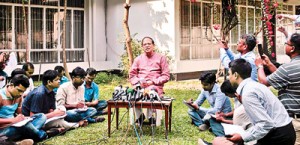Suspect NGO was expecting two foreign remittances, local bank says
A Sri Lankan non-governmental organisation (NGO), at the centre of a billion-dollar global money laundering probe involving unknown hackers who broke into the website of the Bangladesh Central Bank (CB), had been registered with the Registrar of Companies (RoC) on October 16, 2014, a Business Times (BT) investigation has revealed.
The BT probe revealed that this organization, Shalika Foundation exists and has five directors in its incorporation documents at the RoC office. It has a registration number GA2974. The foundation – whose name was splashed across international media headlines – is registered as a company but operates as a social service organization. The names of its directors, which the Business Times has, were given in the RoC document.
The organisation is registered as a company and the contact in the registration form had the telephone number of the lawyer who incorporated it, the BT probe showed. Attempts at contacting two of the directors, its chairperson and another director whose contact numbers were given by another source, proved futile as the calls went unanswered.
A top CB official told the Business Times that their probe revealed that the owner/person behind this organisation is from Hambantota, but is in Japan mostly. He said the Financial Crimes Unit of the CB is in touch with Interpol on this matter. “We have already contacted Interpol to send an international alert on this person so that he can be apprehended,” he said, adding that this was a one-off transaction.
Some of these directors are from Dehiwela, in the suburbs of Colombo. While the Chinese hackers were able to transfer US$81 million to a bank account in the Philippines successfully, the attempt to transfer $20 million to the Sri Lankan NGO, failed due to a typographical slip.
“The FIU has given details of the real culprit, a man based in Hambantota, but mostly in Japan,” he said. He said that CB’s initial probe shows that this NGO might be a ‘front’ for other money laundering. “We will establish that when we get hold of the main culprit,” he said.
Meanwhile it was Sri Lanka’s Pan Asia Bank (PABC) which blew the lid off the money laundering scam. The bank was this week still responding to queries from international media over the incident.“We had a few calls (this week) from international news agencies on the issue,” a spokesperson at Pan PABC said. He said that they had been in touch with some directors at this organisation when the transaction hit their accounts and immediately the bank top management was alerted. “Normally when a large transaction to the tune of $20 million happens, there are alerts. Because the name was wrongfully spelt, we contacted some directors who said that they were to get two remittances (amounts were unclear) for two welfare projects in Sri Lanka.”
The official declined to provide more information citing bank-client confidentiality rules.Meanwhile according to a Wall Street Journal (WSJ) report, authorities in four countries (Bangladesh, the Philippines, Sri Lanka and the US) were still piecing together what happened.
The breach funnelled $81 million from the country’s account at the New York Federal Reserve to personal bank accounts in the Philippines. Another $20 million was directed to a bank in Sri Lanka.In an early sign of fallout from the breach, Bangladesh’s central-bank governor, Atiur Rahman, resigned on Tuesday, the report said.
Mr. Rahman, who had been the governor of Bangladesh Bank for nearly seven years, said he was taking moral responsibility for the loss of the money. Two deputy governors of Bangladesh Bank were relieved of their duties.
The breach began on a quiet Friday last month, when a series of payment instructions arrived at the New York Fed seeking the transfer of nearly $1 billion out of the Bangladeshi account.The transfer requests, which the Fed says were fully authenticated with the correct bank codes, asked to move the money to private accounts in the Philippines and Sri Lanka and appeared to come from the Bangladeshi central bank’s servers in the capital, Dhaka.
But Friday is the weekend in Bangladesh and the central bank’s offices were closed. By the time officials at Bangladesh Bank returned to work, five requests moving about $100 million had gone through. Further transfers totaling roughly $850 million were blocked after the Fed raised a money-laundering alert, a spokesman for Bangladesh Bank said. The fact that the money was being wired to personal bank accounts in the Philippines rang alarm bells.
The $81 million that did leave the bank for the Philippines ended up in the account of a local businessman before making its way to at least two local casinos, the executive director of the country’s Anti-Money Laundering Council, a government task force, said at a hearing at the Philippine Senate on Tuesday.
Julia Bacay-Abad, executive director of the Anti-Money Laundering Council, said the money had apparently been used to buy gambling chips. The council’s investigation ended at the casino’s doors, however. Gambling facilities aren’t covered by the Philippines’ Anti-Money Laundering Law.

Bangladesh’s central-bank governor, Atiur Rahman at a news conference on Tuesday when he resigned over the crisis. Photo: A.M. Ahad/Associated Press
“Manila has returned only $68,000 of the money which was left in the bank accounts,” said a Bangladesh Bank official close to the investigation. “Whoever planned it had thought well ahead.” Cybersecurity experts say the theft of money from the New York Fed shows the vulnerability of emerging economies like Bangladesh, where the rapid growth of the banking system has outpaced regulations and security systems.
Bangladesh foreign-currency reserves touched a record $28 billion in February. Nearly a third of those are held in liquid form in bank accounts at the Fed and the Bank of England, according to Bangladesh Bank officials, the WSJ report said.


